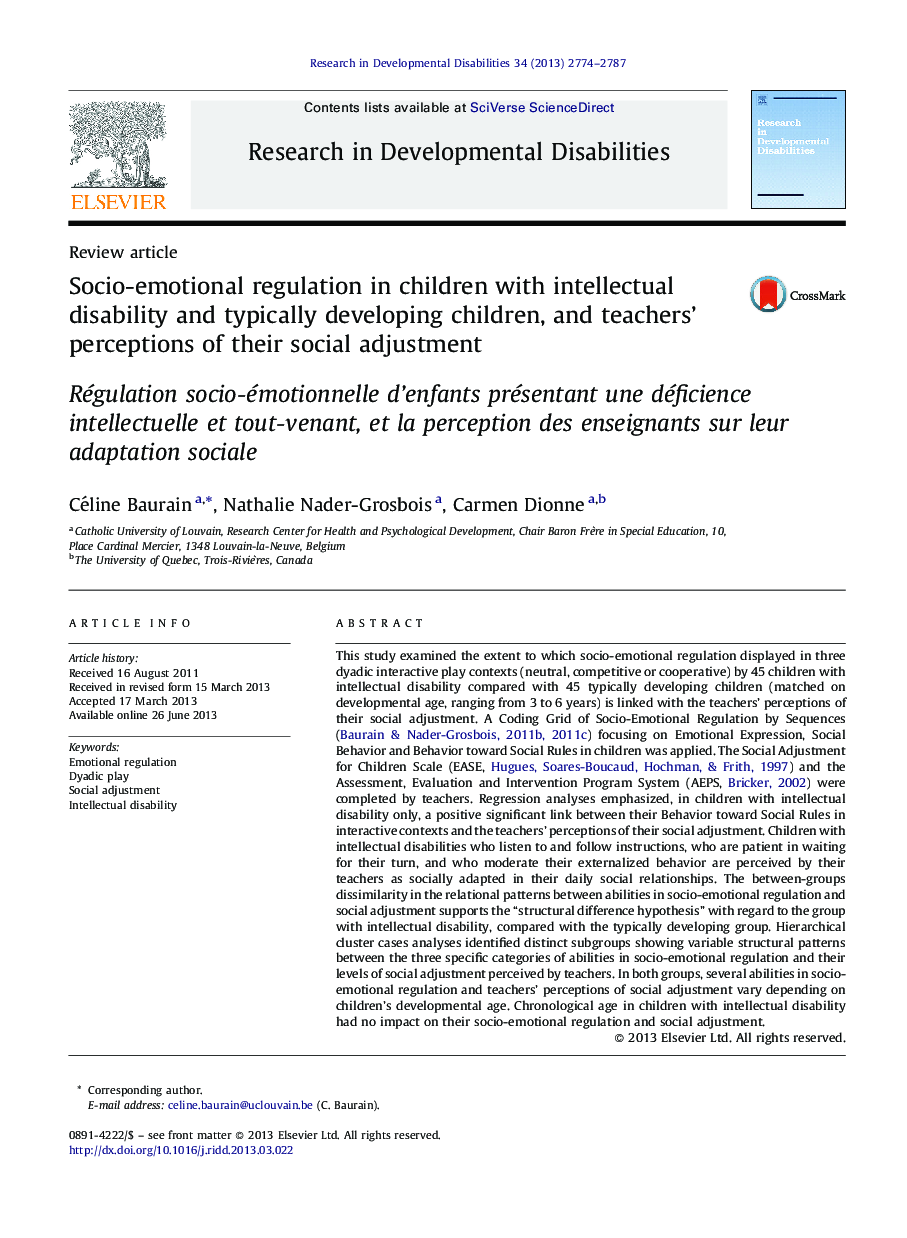| کد مقاله | کد نشریه | سال انتشار | مقاله انگلیسی | نسخه تمام متن |
|---|---|---|---|---|
| 10317763 | 621928 | 2013 | 14 صفحه PDF | دانلود رایگان |
عنوان انگلیسی مقاله ISI
Socio-emotional regulation in children with intellectual disability and typically developing children, and teachers' perceptions of their social adjustment
ترجمه فارسی عنوان
مقررات اجتماعی و احساسی در کودکان دارای معلولیت فکری و به طور معمول کودکان و همچنین ادراک معلمان از سازگاری اجتماعی آنها
دانلود مقاله + سفارش ترجمه
دانلود مقاله ISI انگلیسی
رایگان برای ایرانیان
کلمات کلیدی
موضوعات مرتبط
علوم زیستی و بیوفناوری
علم عصب شناسی
علوم اعصاب رفتاری
چکیده انگلیسی
This study examined the extent to which socio-emotional regulation displayed in three dyadic interactive play contexts (neutral, competitive or cooperative) by 45 children with intellectual disability compared with 45 typically developing children (matched on developmental age, ranging from 3 to 6 years) is linked with the teachers' perceptions of their social adjustment. A Coding Grid of Socio-Emotional Regulation by Sequences (Baurain and Nader-Grosbois, 2011b, Baurain and Nader-Grosbois, 2011c) focusing on Emotional Expression, Social Behavior and Behavior toward Social Rules in children was applied. The Social Adjustment for Children Scale (EASE, Hugues, Soares-Boucaud, Hochman, & Frith, 1997) and the Assessment, Evaluation and Intervention Program System (AEPS, Bricker, 2002) were completed by teachers. Regression analyses emphasized, in children with intellectual disability only, a positive significant link between their Behavior toward Social Rules in interactive contexts and the teachers' perceptions of their social adjustment. Children with intellectual disabilities who listen to and follow instructions, who are patient in waiting for their turn, and who moderate their externalized behavior are perceived by their teachers as socially adapted in their daily social relationships. The between-groups dissimilarity in the relational patterns between abilities in socio-emotional regulation and social adjustment supports the “structural difference hypothesis” with regard to the group with intellectual disability, compared with the typically developing group. Hierarchical cluster cases analyses identified distinct subgroups showing variable structural patterns between the three specific categories of abilities in socio-emotional regulation and their levels of social adjustment perceived by teachers. In both groups, several abilities in socio-emotional regulation and teachers' perceptions of social adjustment vary depending on children's developmental age. Chronological age in children with intellectual disability had no impact on their socio-emotional regulation and social adjustment.
ناشر
Database: Elsevier - ScienceDirect (ساینس دایرکت)
Journal: Research in Developmental Disabilities - Volume 34, Issue 9, September 2013, Pages 2774-2787
Journal: Research in Developmental Disabilities - Volume 34, Issue 9, September 2013, Pages 2774-2787
نویسندگان
Céline Baurain, Nathalie Nader-Grosbois, Carmen Dionne,
